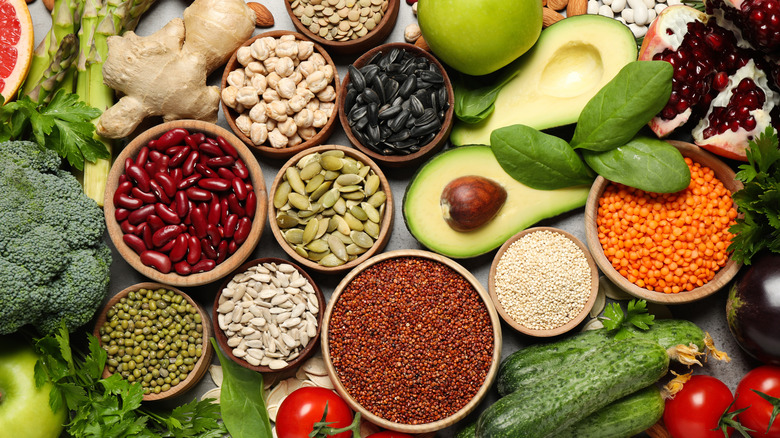New Research Reveals The Benefits Of A Vegan Diet On Blood Sugar
When our parents or grandparents used to tell us to eat our vegetables — and more of it, at that — we don't know if they were thinking about protecting us from diabetes or obesity, yet that is exactly what research has found a vegan diet may be able to do, according to Denmark's Steno Diabetes Center whose researchers presented their findings at the European Congress on Obesity, per Insider.
The study involved a meta-analysis of 11 random trials, where researchers looked at the independent studies to try and pick out trends. Nearly 800 participants were involved in the study, all of who had either obesity or type 2 diabetes. The studies compared lasted for a minimum of 12 weeks, averaging 19. Across all 11 trials, researchers found those following a vegan diet lost an average of nine pounds. When compared to participants on other diets (like the popular Mediterranean diet), those on the vegan diet lost almost six more pounds; and compared to those who didn't change their eating habits at all, those following a vegan diet lost an average of 16 pounds more.
U.S. News and World Report shared that the researchers also found vegan diets can lead to better blood sugar and overall cholesterol levels, though it didn't appear to move the needle on participants' blood pressure or triglyceride levels.
The study had its limitations
But there were limits to the trials: Insider reports the diets used across the different groups weren't matched according to nutrients or calories. Still, as the Steno Diabetes Center's Anne-Ditte Termannsen, who led the research, states, the study was "[a] rigorous assessment of the best available evidence to date [and] indicates with reasonable certainty that adhering to a vegan diet for at least 12 weeks may result in clinically meaningful weight loss and improve blood sugar levels, and therefore can be used in the management of overweight and type 2 diabetes," per The Guardian, who also reported on the new research.
Termannsenn also felt that, because vegan food on the whole has a higher fiber content than dishes containing animal and dairy products, participants adhering to a vegan diet were likely consuming fewer calories than the others. Insider explains fiber is seen as an essential carbohydrate that can not only keep diners feeling fuller longer, but also help regulate blood sugar levels.
The recent study tracks other findings
This study is just the latest to tout the benefits of eating a plant-based diet. For instance, findings in one study published in the Journal of Geriatric Cardiology in 2017 reveal that vegans in general gain less weight than their meat-eating counterparts as they age. More recently — in February of this year — researchers at Oxford University found vegetarians to have a 14% lower risk of developing some cancers than those who eat meat (via The Guardian).
Healthline shares that studies have found vegan diets tend to deliver more of certain nutrients, including fiber, antioxidants, folate, and magnesium. But the site also warns that vegan diets must be properly structured to deliver enough of things like calcium, iodine, selenium, and zinc. As a result, it may be essential for vegans to amp up their diets with targeted supplements.
If you're not on board with giving up animal proteins entirely, it's still worth considering increasing the amount of plant-based foods you eat in your diet, as it could reduce the risk of type 2 diabetes and help stabilize blood sugar levels.


